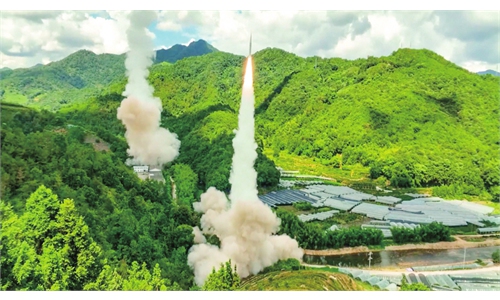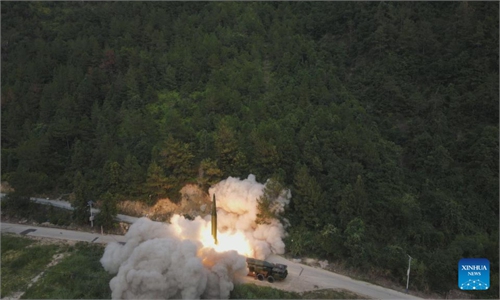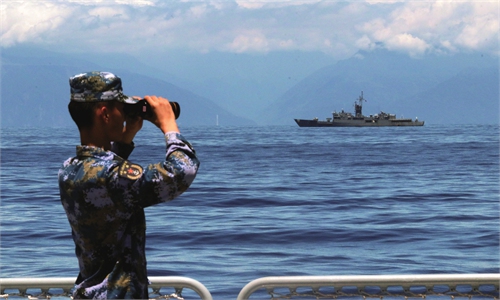US receives limited endorsements from allies on its groundless accusation against China on Taiwan Straits tension, proving one-China principle a strong international consensus
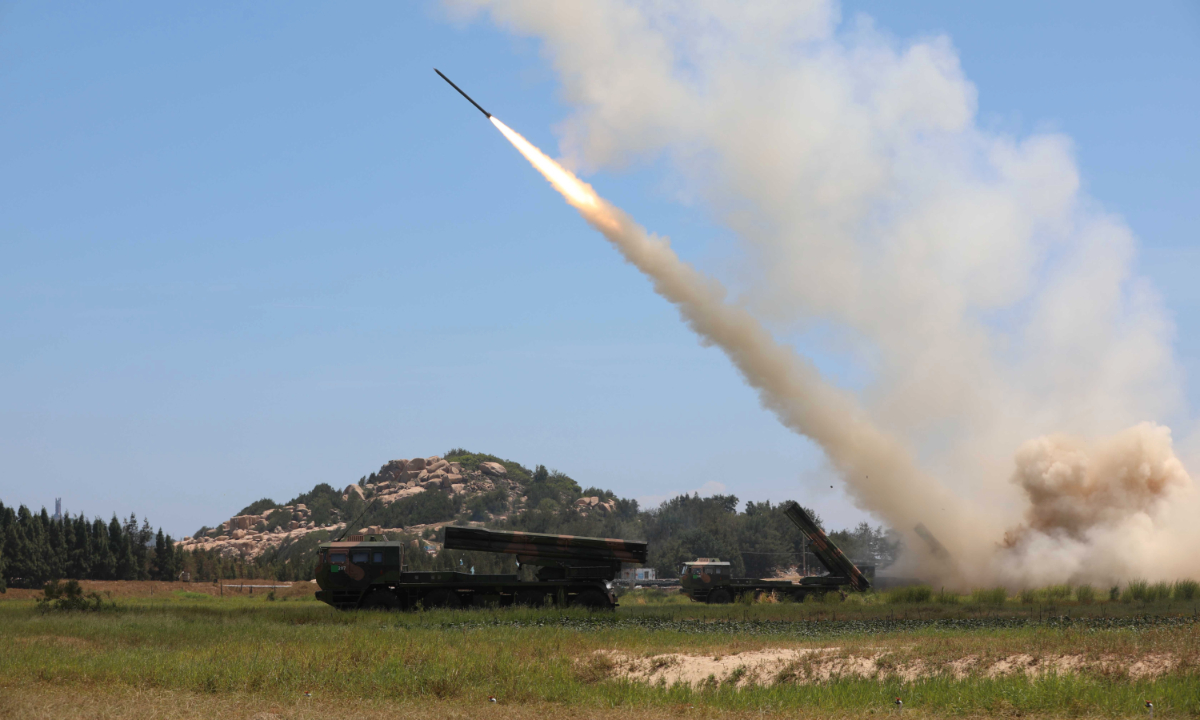
The army of the Eastern Theater Command of the Chinese People's Liberation Army (PLA) conducts long-range live-fire drills in the Taiwan Strait, Aug. 4, 2022. The Eastern Theater Command on Thursday conducted joint combat exercises and training around the Taiwan Island on an unprecedented scale. Photo:Xinhua
The US is trying to piece together its limited influence to gather endorsements from its allies to follow its stance on condemning China's legitimate military actions around the island of Taiwan recently in responding to US House Speaker Nancy Pelosi's provocative trip to the island.
Only a few US allies like Japan and Australia have remained in lockstep with Washington's stance closely on Saturday, and other countries, whether European major powers or US key ally in the region like South Korea, are being far more restrained as some only expressed "concerns over tension" or just urged "deescalating the tension" without condemning China's countermeasures, while China has already received support from more than 160 countries in regard to its legitimate response in safeguarding its sovereignty, and the vast majority of members of the international community are condemning or expressing concern regarding Pelosi's provocative and irresponsible visit that threatens and harms the world peace.
Chinese analysts said this has proved US's further shrinking global influence following the outbreak of Russia-Ukraine conflict in February this year when the US marshalled the Western world to sanction Russia. The US has united even fewer countries to join its provocation and condemnation against China on the current Taiwan Straits tension this time, because the one-China principle is an unshakable international consensus, and the world is sick of US double-standards on "sovereignty and territorial integrity" when handling different matters.
On Saturday, US Secretary of State Antony J. Blinken, Australian Foreign Minister Penny Wong, and Japanese Foreign Minister Hayashi Yoshimasa met in Phnom Penh on the margins of the ASEAN Foreign Ministers' Meeting. The top diplomats of the three countries expressed their concern about "the People's Republic of China's (PRC) recent actions that gravely affect international peace and stability, including the use of large-scale military exercises. They condemned the PRC's launch of ballistic missiles" and "urged the PRC to immediately cease the military exercises."
Analysts said this tone is more provocative than the previous G7 statement and is also more hostile than the stance held by the EU and major European countries which just expressed "concerns," and the three countries' top diplomats have totally turned a blind eye to the Pelosi's visit which is the root reason of the current tension.
For instance, German Foreign Ministry spokesman Christofer Burger called for "de-escalation in the region, stressing that disputes should be resolved peacefully and by mutual agreement of all sides," without any condemnation, and German deputy government spokesman Wolfgang Buchner told a news conference in Berlin that Germany remains committed to 'one China' policy.
Although Germany is a G7 member, its stance, especially when German officials make their own statements, is at least more neutral and nuanced than the G7 statement which was actually produced under the US influence and pressure, according to a Beijing-based expert on international relations who asked for anonymity.
Similarly, South Korean Foreign Minister Park Jin on Friday expressed "concerns over rising tensions surrounding Taiwan." While South Korea supports the "one China policy," Park said it is important to maintain peace and stability across the Taiwan Strait given its strategic importance of security and economy, Yonhap News reported.
Hua Chunying, a spokesperson for the Chinese Foreign Ministry, said at a routine press conference on Friday that "in the wake of Pelosi's visit to Taiwan, over 160 countries have spoken up for justice, condemned the visit as a serious, reckless and irresponsible provocation and expressed their commitment to the one-China principle and support for China's efforts to uphold sovereignty and territorial integrity."
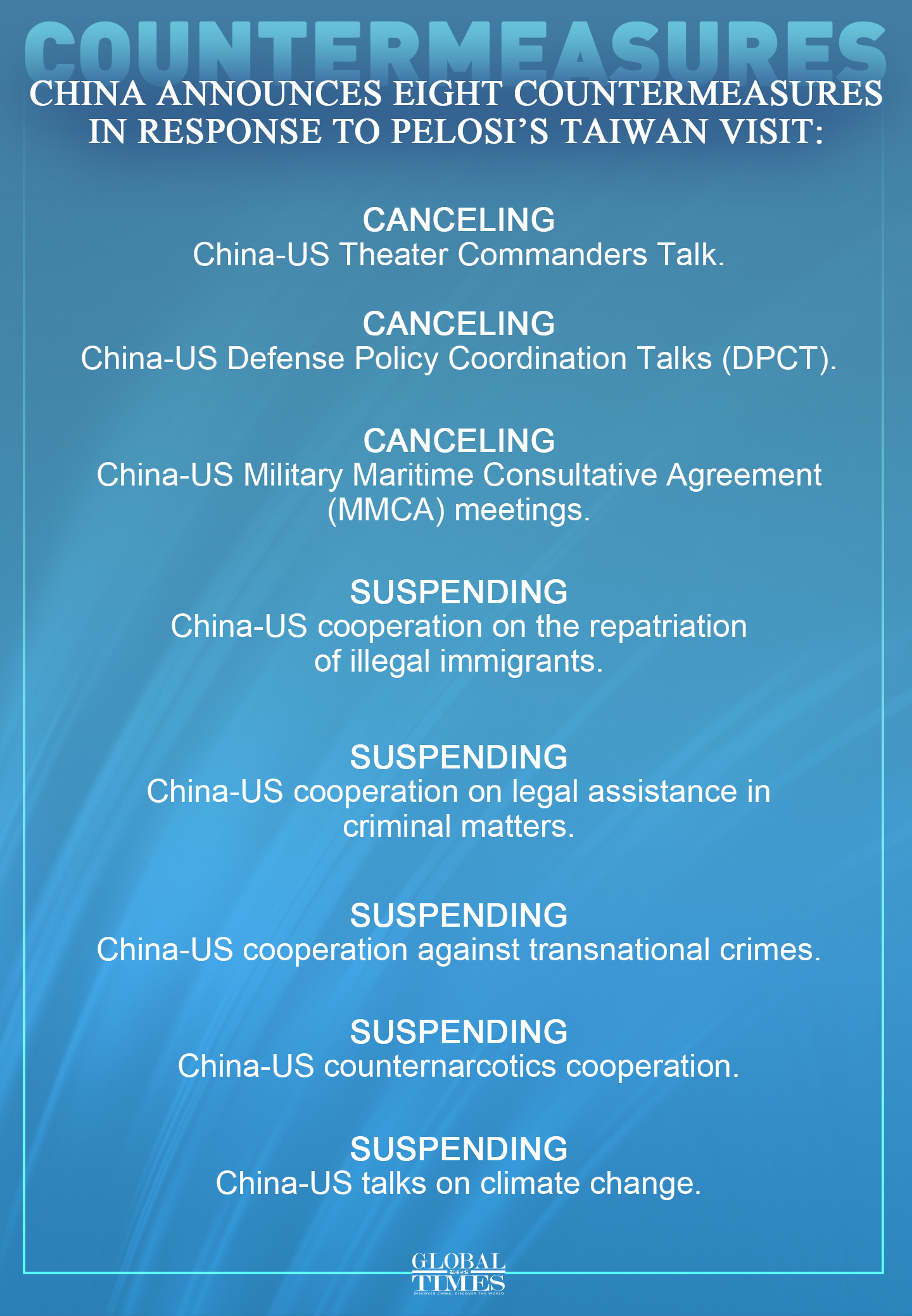
China announces eight countermeasures in response to Pelosi's Taiwan island visit. Graphic:GT
Wang Yiwei, director of the Institute of International Affairs at the Renmin University of China, told the Global Times on Saturday that the reactions from the international community has proved that most countries around the globe can see the fact clearly that it was the US which was undermining the UN-centered international order.
The UN General Assembly adopted Resolution 2758 in 1971, which decides to restore the lawful rights of the People's Republic of China (PRC) in the United Nations and to recognize the representatives of the PRC government as the only legitimate representatives of China to the United Nations.
"The one-China principle has already become the internationally recognized consensus. Through Pelosi's visit to the island, the US, some of its allies and the secessionist Taiwan authorities are openly challenging the core spirit of the UN Resolution 2758, and they even used the 'democracy' as pretext to justify their violation of the international consensus and UN resolution," Wang said.
This is yet more proof of power politics played by the US, because in this case, the US has no respect for China's sovereignty, and many developing countries share China's feeling because they know how dangerous could be if the world allowed the US to use "democracy and freedom" to interference other countries' internal affairs, and how hypocritical the US is in playing double-standard on the sovereignty, Wang noted.
The Malaysian Prime Minister's Special Envoy to China released a statement urging Western nations to desist with practicing double standards by trying to compare Taiwan with Ukraine or trying to encircle Russia and call for respect for Ukraine's sovereignty and territorial integrity on one hand while meddling in China's internal affairs and intending to use Taiwan to divide China on the other. This would be using democracy as a pretext to interfere in and infringe upon China's sovereignty in violation of basic principles of international law.
Lü Xiang, an expert on US studies at the Chinese Academy of Social Sciences, told the Global Times that "It's interesting that when reporting or analyzing the current Taiwan Straits tension caused by Pelosi's visit, most US media and scholars are being very careful, as they avoid talking about 'sovereignty,' a term they frequently used on the Ukraine crisis."
The US is trying to weaken or distort the international consensus of the one-China principle based on its hegemonic interests, so that one day it could openly separate Taiwan island from China, but such attempt is doomed to fail, because of China's growing strength and the unshakable international order with the UN at its core, said analysts.
"Many Western countries, even some G7 members, have actually been forced by the US to take a position on the matter, as they don't want to get involved and impact their ties with China." Now they have seen China's strong countermeasures and sanctions on Pelosi from all aspects, this will make them remain more rational and to keep distance with the US hostile stance against China, Lü said.
Considering the current mainstream attitudes and voices across the international community, Chinese analysts believe that the US cannot fool every nation and can't even keep the Western countries to follow it closely on Taiwan question, especially when the tension is in fact caused by the provocation made by the US side, and if one day, China is forced by the US to solve Taiwan question once and for all, to use military means to safeguard its sovereignty and territorial integrity, China will have the supports and understanding from the vast majority of the international community.

